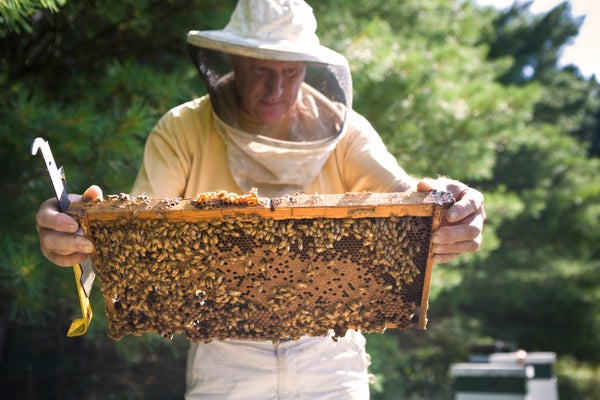This article was published in Scientific American’s former blog network and reflects the views of the author, not necessarily those of Scientific American
Two years ago, Bob and Jane knew nothing about beekeeping.
But they scoured books, blogs and research articles. They joined online and community beekeeping groups and watched YouTube videos. They shadowed master beekeepers. They created their own syllabus for what they needed to learn, and assigned themselves homework. Eventually, they formed their own beekeeping groups to help others set up their colonies. And now they’re expert beekeepers, tending six colonies.
Should we be surprised that Bob and Jane aren’t in their 20s or 30s, but rather in their late 50s?
On supporting science journalism
If you're enjoying this article, consider supporting our award-winning journalism by subscribing. By purchasing a subscription you are helping to ensure the future of impactful stories about the discoveries and ideas shaping our world today.
We shouldn’t. Bob and Jane’s experience mirrors that of others, detailed in memoirs that describe middle-aged or older adults who have learned new skills. Late to the Ball, for example,by Gerald Marzorati, describes how he learned to play tennis in his 50s. Old in Art School, by Nell Painter, describes how she received a bachelor's and master's in painting after retiring from Princeton as a history professor. Ernestine Shepherd is, as far as anyone knows, the world’s oldest bodybuilder—but she didn’t even start to exercise until her 50s. Irving Olson adapted to changing photographic technology over nine decades and was featured in Smithsonian magazine for developing cutting-edge techniques when he was 98 years old.
These experiences should be celebrated. But why do they seem extraordinary?
We think it is because experts and laypeople alike emphasize that maintaining mental and physical abilities ("staying active") is the best way to avoid cognitive decline in adulthood, especially older adulthood. The recommendations for doing so, such as physical exercise, healthy eating and doing crossword puzzles, don’t prioritize learning new skills.
Consider that 50 percent of adults over age 40 in a 2017 AARP survey self-reported that they don’t learn new information every week. That includes googling for new information. Our research team proposes that the benefits of learning and mentally growing—such as learning new skills like beekeeping—outweigh those of maintaining.
Why should adults learn new things in midlife and beyond? The ability to live independently requires periodic “upgrades” because of changes in our environment, especially due to technological advances. Cellphone providers are disconnecting 3G networks, and health care providers are moving toward online-only access to patients' medical records. This means learning how to use a smartphone, or new online portals. And if people avoid learning these skills themselves, it fosters functional dependence—asking others to do stuff for them.
To facilitate learning new things, adults can borrow lessons from childhood, when cognitive growth and learning are a given. We say babies and children absorb new information like sponges. This sponginess is partially because they learn multiple skills simultaneously, they commit to learning, and they get encouragement from teachers and caregivers. And when infants and children are exposed to environments with low expectations and resources, we scramble to fix the situation.
In contrast, adults—especially older adults—almost always find themselves in the latter situation. They face a discouraging learning environment with low expectations and resources, such as access to teachers, and efforts to fix these issues are minimal.
Our research team conducted a study, recently published in the Journals of Gerontology, Series B: Psychological Sciences. Our hypothesis: learning multiple new skills in an encouraging environment in older adulthood leads to cognitive growth, just like it does in childhood. We asked older adults 58 to 86 years old to simultaneously take three to five new classes (approximately 15 hours per week on average), similar to the undergraduate course load, for three months.
These classes included learning Spanish, how to use an iPad, photography, drawing/painting, and music composition. They also attended weekly one-hour sessions with us to discuss barriers to learning, the value of learning new skills for functional independence, and resilience in aging.
We then measured changes in short-term memory—such as remembering a phone number for a few minutes—and cognitive control, or switching between tasks.
The learning intervention participants increased their cognitive abilities to levels similar to those of middle-aged adults, 30 years younger, after just 1.5 months. We are investigating how long these benefits last. The control group, who did not participate in the classes, but were active community members, maintained their cognitive abilities at levels similar to those of older adults in general.
The take-home message: not only can older adults learn multiple new skills at the same time in the right environment and with the right beliefs, but doing so may improve their cognitive functioning considerably.
The intervention brought older adults out of their comfort zones, and made them feel fearless about new challenges. At the start of the intervention, many older adults thought they could barely walk a mental mile, but they completed a triathlon.
